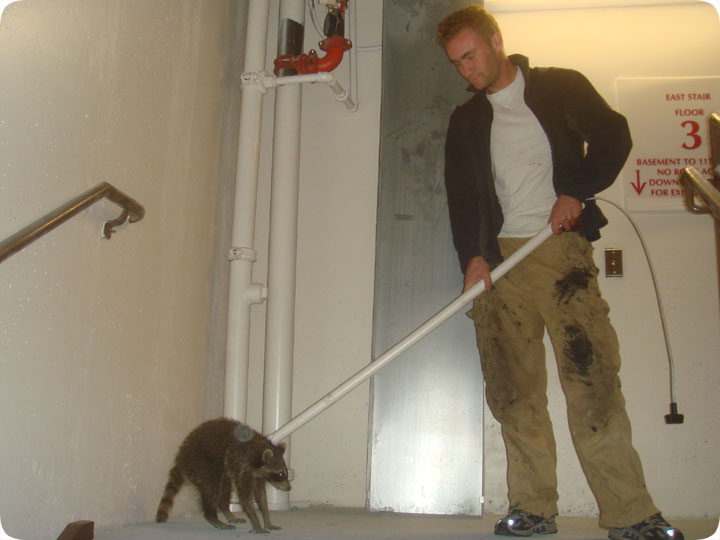-
info@aaanimalcontrol.com
Call us for help in your town
Humane Wildlife Education
City Raccoon - Urban Raccoon Control

02.18.2006 - Cities are chock-full of raccoons. It's this way not only down here in Florida, but all over the country. Raccoons have become urbanized city
dwellers. They used to stay only in the undeveloped forests. But raccoons are intelligent and adaptable animals, and they have learned that cities make a great
place to live. There's plenty of tasty garbage and pet food to eat, not to mention that handouts that some people insist on giving them (a dumb thing to do, and
ultimately unkind to animals). And there's also lots of great places to live that are far better than trees. From under sheds to inside attics, human structures
tend to make great places to live.
The raccoon in this photograph was right at home living in an apartment building. Raccoons in many areas have simply lost their
fear of people. They are very strong and can defend themselves, even against big dogs, and there's just no hunters or fur trappers round yon parts any more, so raccoons
now stroll the city streets with impunity. The one in this apartment wasn't afraid of people. However, people were afraid of it. They could have been attacked
at any time - not likely - but the apartment complex didn't want to take a chance. And people were afraid that it had rabies. It didn't but people are often
misinformed about wildlife.
Thus, we were called to capture it and relocate it far away. Pictured in the photograph is my apprentice Ben, who grabbed the raccoon
with his snare pole. It took a little effort to catch, but it was easier than catching a purely wild forest raccoon on the run, that's for sure. We put it in a
transfer cage and drove it to a non-developed wildlife preserve twenty miles outside of the city. Now I guess this city coon has to learn to live in the wild!
We specialize in nuisance wildlife control - this is the field of removing unwanted wildlife from homes and property, and solving conflicts between people and wild animals. From home inspections to preventative repairs, wildlife trapping, attic cleanups and more, we solve
critter problems with professional expertise. Call me, David, or click on the below link to find any one of hundreds of wildlife trappers in every city and town in the US.
Do it yourself: Visit my How To Get Rid of Raccoons page for tips and advice.
Get professional help: Visit my Nationwide Pro Directory of wildlife removal experts.
For more wildlife stories, click my Wildlife Blog
or click my below banner to hire a local trapper.
Raccoons are excessively adaptable and are overtaking the urban environment. Raccoon control in urban environments has turned out to be extremely challenging.
What You Should Know About Raccoons?
Traditionally, raccoons preferred woody areas with abundant vegetation and water surrounding it. However, over time, they have moved to suburban and urban areas finding shelter in attics, sheds, barns, chimney, decks, and sewers. Moreover, raccoons tend to stay within 1-mile range from their den for quick hiding.
Being overly adaptive, raccoons can eat anything such as trash, pet food, bird seeds, etc. And, their excellent night vision is an additional plus to attack the places where food is available. The smart critters can do multiple stunts to access their food like unzip tent zippers, turn doorknobs, open refrigerators, and much more.
How to Prevent Urban Raccoons from Invading Your Home?
Raccoon prevention requires similar wildlife controls that you would need for other critters:
Frightening Devices: The foremost step to discourage these nocturnal pests is using lights, loud noises, and playing a radio at night. However, repetition of the same trick can make the raccoons get used to it.
Reduce Attractions: Food is the biggest attraction for wildlife animals. To discourage the uninvited guest, keep pet food indoors, remove all food sources before dusk from the backyard, and cut down any attractive fruit trees along the walls. If the animals can possibly access the roof after climbing the treetops, place a slick tin sheet at the roof edge. This makes the animal lose footing after jumping onto the roof preventing its access into the house via chimney or attic.
Seal Holes: Look for crevices and eaves, open windows, etc. and seal them properly. Prevent the animals from entering any of your home spaces. Regularly visit the basement, attic, etc. to remove any unwanted guests residing inside your home.
Fencing: Raccoons love sweet corn and watermelon. Broken stalks and paw-filled rinds are indicative of a raccoon presence. The best way to prevent raccoons is by using electric wires that are properly grounded. Electric fencing is a great way to discourage the nuisance raccoons away from your property.
Trapping: Set live traps to capture raccoons within your vicinity and release them away from the residential area to a new space where an ample amount of food and water is accessible. If you do not know how to trap the raccoon trying to invade your home, call for professional help for raccoon removal.
Why is Raccoon Removal Necessary?
Although sharing the earth and its resources with wildlife is important, awfully cute raccoons can cause tremendous damage too. They can eat away insulations, chew up wires, tear holes through the wall, and much more. Moreover, their poop can possibly contain parasites that can get inside your lungs upon inhaling it or your pets may become carriers of it.
However, killing raccoons isn't the right solution. It's better to discourage them, live trap them, and relocate them.




















